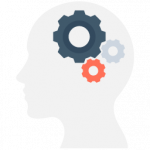Affective Learning
Affective learning deals with how learning relates to students individual interests, attitudes, emotions, and motivations. Affect plays an important role in memory retrieval, creativity, decision-making, and many other cognitive functions.
Cooperative Learning
Cooperative learning makes use of learning activities that are designed to provide academic and social experiences. Students work together to complete tasks related to learning objectives. Instructors take on the role of a facilitator rather than lecturer.
 Wavelength
Wavelength
 Think-Pair-Share
Think-Pair-Share
 Polling
Polling
 Icebreaker Questions
Icebreaker Questions
 Directed Paraphrasing
Directed Paraphrasing
Differentiated Instruction
Differentiated instruction considers learners’ individual abilities and levels of readiness first before designing learning activities. Differentiating instruction may involve the use of a variety of teaching strategies to deliver the same material, or the material itself may vary based on individual learner characteristics.
 One Minute Paper
One Minute Paper
 Memory Matrix
Memory Matrix
 Background Knowledge & Misconception Check
Background Knowledge & Misconception Check
 Application Cards
Application Cards
Experiential Learning
Experiential learning is a hands-on approach where students learn by doing.
Flipped Classroom
Flipped classroom is a type of blending learning where students learn asynchronously outside of the classroom before attending class (virtual or in-person). Work done before class may include viewing online lectures, reading, or conducting research. Class time is then used for problem-solving, discussion, and active learning activities.
Inquiry-based Learning
Inquiry-based learning involves posing questions, scenarios, or problems for learners to research. Instructors take on the role of a facilitator rather than lecturer.
Metacognition
Metacognition relates to the awareness and understanding of one's own thought process. Simply put, metacognition is thinking about thinking. As a teaching strategy, metacognition can be used to improve learners' understanding of material, identify areas of weakness in their own understanding, and improve problem-solving skills.
Personalized Learning
Personalized learning allows students to choose how they will learn based on their own learning preferences, pace of learning, and personal interests. Personalized learning is similar to differentiated instruction, however, the focus of personalized learning is on student choice while differentiated instruction focuses on the instructor's design and delivery of material.
Reflective Learning
Reflective learning is a teaching strategy and component of metacognition in which students reflect on their own individual learning with the goal of clarifying what they have learned and making meaning out of the material.
 Ticket Out the Door
Ticket Out the Door
 Student Generated Test Questions
Student Generated Test Questions
 One Sentence Summary
One Sentence Summary
 Muddiest Point
Muddiest Point
 Exam Wrapper
Exam Wrapper
Socio-emotional Learning (SEL)
Socio-emotional learning involves the integration of social and emotional skills into the curriculum. There are five components to socio-emotional learning:
1. Self-awareness
2. Self-management
3. Social awareness
4. Relationship skills
5. Responsible decision-making
 To Tell the Truth
To Tell the Truth
 Ticket Out the Door
Ticket Out the Door
 Personal Artifacts
Personal Artifacts
 Icebreaker Questions
Icebreaker Questions

